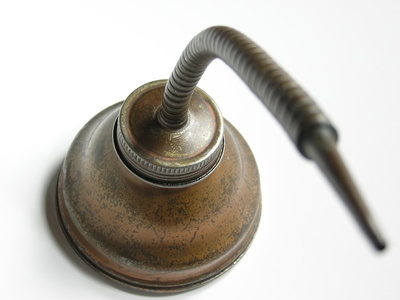
Hydraulic oil is a type of precisely engineered hydraulic fluid with a high viscosity, low volatility and, generally speaking, a low level of toxicity. Though hydraulic oil is not considered a hazardous material, care must be taken in handling and disposing of used hydraulic oil, both for the sake of the environment and for one's own health and well being.
Hydraulic oil poses an environmental hazard and can easily contaminate the local ecosystem if not handled properly. Take care in transporting and pouring hydraulic oil to avoid spills and drips. In the event of a spill, saw dust or cat litter can be used to absorb large amounts of liquid. Do not dispose of oil contaminated substances in the regular garbage. Instead, consult your local hazardous material authority or landfill as to the best method of disposal. When disposing of used hydraulic oil, many landfills and garbage dumps have specific containers set aside for oil recycling and disposal.
Skin contact with hydraulic oil is not normally cause for alarm, though prolonged exposure may result in minor irritation. If hydraulic oil comes in contact with your eye, flush it thoroughly with water and then seek medical attention if irritation occurs.
If you accidentally swallow hydraulic oil, immediately contact emergency services or your local poison control office. Wash hydraulic oil from your mouth but do not induce vomiting. Short-term effects may include nausea, dizziness or general discomfort, but long-term effects can be very serious if not treated immediately.
The most potentially dangerous form of contact with hydraulic oil is through inhalation of vaporized oil, either from hydraulic oil that has caught on fire or oil that has been sprayed into the surrounding atmosphere. Though short-term effects may include irritation, coughing and many of the usual side effects of inhaling smoke or vapor, long-term exposure may have potentially life-threatening health risks. If you know that you will be coming into contact with vaporized hydraulic oil, use a respirator approved for filtering organic solvents or a supplied air filter for exposure to dangerous levels of smoke or gas.
Hydraulic oil is a non-volatile substance, but if it is heated beyond 300 degrees Fahrenheit, it can spontaneously burst into flames or cause an explosion of the oil if held under pressure. In the even of an oil fire, use a gas or foam extinguisher to smother the flames. Do not use water to put out the fire as it will cause the oil to dissipate and the fire to spread. The oil runoff from this kind of fire will also contaminate the local environment. If the fire is too much to control easily, evacuate the area and call your local emergency team.